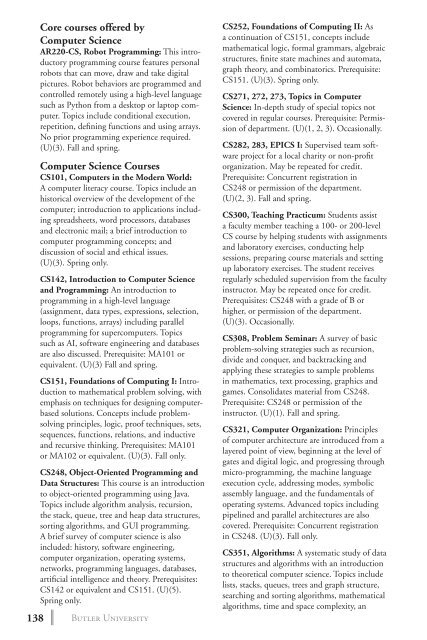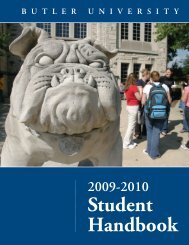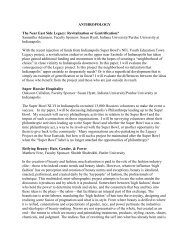2 0 1 3 bulletin - Butler University
2 0 1 3 bulletin - Butler University
2 0 1 3 bulletin - Butler University
Create successful ePaper yourself
Turn your PDF publications into a flip-book with our unique Google optimized e-Paper software.
138<br />
Core courses offered by<br />
Computer Science<br />
AR220-CS, Robot Programming: This introductory<br />
programming course features personal<br />
robots that can move, draw and take digital<br />
pictures. Robot behaviors are programmed and<br />
controlled remotely using a high-level language<br />
such as Python from a desktop or laptop computer.<br />
Topics include conditional execution,<br />
repetition, defining functions and using arrays.<br />
No prior programming experience required.<br />
(U)(3). Fall and spring.<br />
Computer Science Courses<br />
CS101, Computers in the Modern World:<br />
A computer literacy course. Topics include an<br />
historical overview of the development of the<br />
computer; introduction to applications including<br />
spreadsheets, word processors, databases<br />
and electronic mail; a brief introduction to<br />
computer programming concepts; and<br />
discussion of social and ethical issues.<br />
(U)(3). Spring only.<br />
CS142, Introduction to Computer Science<br />
and Programming: An introduction to<br />
programming in a high-level language<br />
(assignment, data types, expressions, selection,<br />
loops, functions, arrays) including parallel<br />
programming for supercomputers. Topics<br />
such as AI, software engineering and databases<br />
are also discussed. Prerequisite: MA101 or<br />
equivalent. (U)(3) Fall and spring.<br />
CS151, Foundations of Computing I: Introduction<br />
to mathematical problem solving, with<br />
emphasis on techniques for designing computerbased<br />
solutions. Concepts include problemsolving<br />
principles, logic, proof techniques, sets,<br />
sequences, functions, relations, and inductive<br />
and recursive thinking. Prerequisites: MA101<br />
or MA102 or equivalent. (U)(3). Fall only.<br />
CS248, Object-Oriented Programming and<br />
Data Structures: This course is an introduction<br />
to object-oriented programming using Java.<br />
Topics include algorithm analysis, recursion,<br />
the stack, queue, tree and heap data structures,<br />
sorting algorithms, and GUI programming.<br />
A brief survey of computer science is also<br />
included: history, software engineering,<br />
computer organization, operating systems,<br />
networks, programming languages, databases,<br />
artificial intelligence and theory. Prerequisites:<br />
CS142 or equivalent and CS151. (U)(5).<br />
Spring only.<br />
<strong>Butler</strong> <strong>University</strong><br />
CS252, Foundations of Computing II: As<br />
a continuation of CS151, concepts include<br />
mathematical logic, formal grammars, algebraic<br />
structures, finite state machines and automata,<br />
graph theory, and combinatorics. Prerequisite:<br />
CS151. (U)(3). Spring only.<br />
CS271, 272, 273, Topics in Computer<br />
Science: In-depth study of special topics not<br />
covered in regular courses. Prerequisite: Permission<br />
of department. (U)(1, 2, 3). Occasionally.<br />
CS282, 283, EPICS I: Supervised team software<br />
project for a local charity or non-profit<br />
organization. May be repeated for credit.<br />
Prerequisite: Concurrent registration in<br />
CS248 or permission of the department.<br />
(U)(2, 3). Fall and spring.<br />
CS300, Teaching Practicum: Students assist<br />
a faculty member teaching a 100- or 200-level<br />
CS course by helping students with assignments<br />
and laboratory exercises, conducting help<br />
sessions, preparing course materials and setting<br />
up laboratory exercises. The student receives<br />
regularly scheduled supervision from the faculty<br />
instructor. May be repeated once for credit.<br />
Prerequisites: CS248 with a grade of B or<br />
higher, or permission of the department.<br />
(U)(3). Occasionally.<br />
CS308, Problem Seminar: A survey of basic<br />
problem-solving strategies such as recursion,<br />
divide and conquer, and backtracking and<br />
applying these strategies to sample problems<br />
in mathematics, text processing, graphics and<br />
games. Consolidates material from CS248.<br />
Prerequisite: CS248 or permission of the<br />
instructor. (U)(1). Fall and spring.<br />
CS321, Computer Organization: Principles<br />
of computer architecture are introduced from a<br />
layered point of view, beginning at the level of<br />
gates and digital logic, and progressing through<br />
micro-programming, the machine language<br />
execution cycle, addressing modes, symbolic<br />
assembly language, and the fundamentals of<br />
operating systems. Advanced topics including<br />
pipelined and parallel architectures are also<br />
covered. Prerequisite: Concurrent registration<br />
in CS248. (U)(3). Fall only.<br />
CS351, Algorithms: A systematic study of data<br />
structures and algorithms with an introduction<br />
to theoretical computer science. Topics include<br />
lists, stacks, queues, trees and graph structure,<br />
searching and sorting algorithms, mathematical<br />
algorithms, time and space complexity, an
















